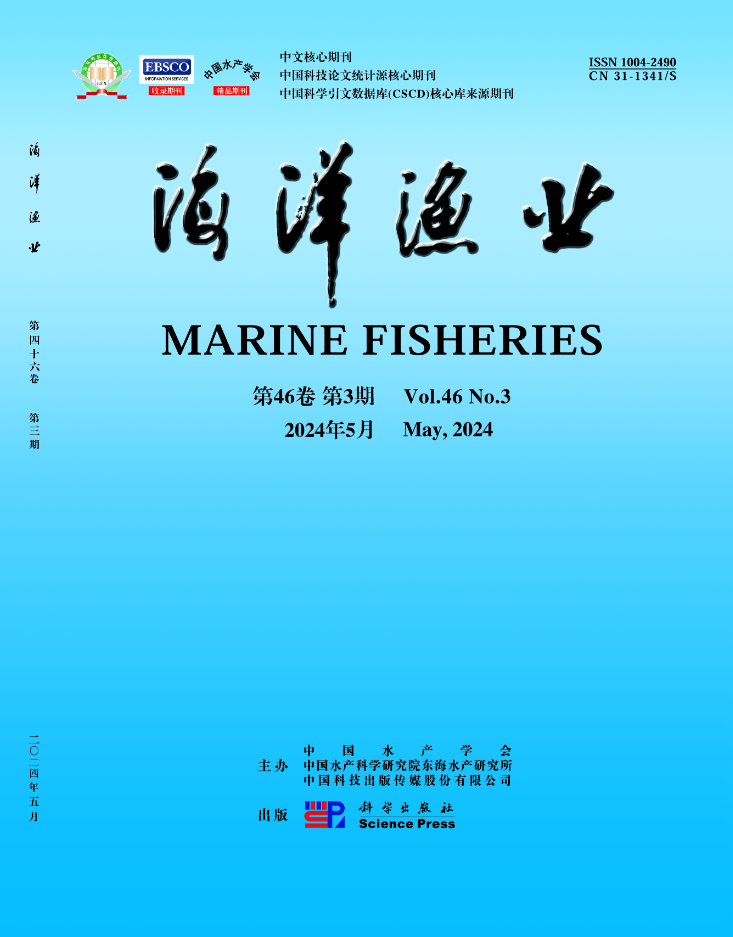UKURAN LAYAK TANGKAP DAN DAMPAK EKOLOGIS PENANGKAPAN BARONANG (Siganidae) DI PERAIRAN PULAU HARAPAN, KEPULAUAN SERIBU, JAKARTA
引用次数: 0
Abstract
Rabbitfishes (Siganids) fishing activities tend to increase and potentially impact fish target and ecosystem, which is indicated by changes in population size and structure and the trophic level of the catches. Scientific information on Siganids fishing techniques and its ecological impact are limited. The aims of the study are: (1) to describe technical fishing aspects of Siganids fishery; (2) to estimate parameters of length at first maturity (Lm) as catch size limit indicators for this fish target; (3) to evaluate the impact of fishing on food chain balances (trophic level) the fish resources in this study area. The Siganids fishing techniques were observed during the field study. The catch of Siganids species and other fishes from various fishing gears were sampled, then identified and calculated individually. The samples of Siganids fish were also measured for its length and weight. This study showed that the fishers were used three kinds of fishing gears to target the Siganids fish, i.e., rope traps, bamboo traps, and spear gun. There were five species of Siganids caught during the research, they are: Barhead spinefoot (Siganus virgatus), Goldspotted spinefoot (S. punctatus), Streaked spinefoot (S. javus), Orange-spotted spinefoot (S. guttatus), and White-spotted spinefoot (S. canaliculatus), with the Lm value of 3.5, 22.8, 30.6, 21.2, and 20.8 cm, respectively. All catches of the Siganids exceeded the catch size limit (Lm), except for S. punctatus and S. Javus which was only 65.51% and 4.00% of the respective catches were acceptable in size. Finally, the Siganids fishing activities in the study area potentially impacted the ecological function of natural food chain balance (trophic level). It was indicated by the dominance (48%) of the catches on trophic level 3. Keywords: fishing impact, rabbitfish, Siganidae, size limit, trophic level在雅加达好望岛希望之岛(Siganidae)捕获男爵(Siganidae)的可行措施
兔鱼(Siganids)的捕捞活动有增加的趋势,并对鱼类目标和生态系统产生潜在的影响,这体现在种群规模和结构的变化以及渔获的营养水平上。关于Siganids捕捞技术及其生态影响的科学信息有限。本研究的目的是:(1)描述Siganids渔业的技术捕捞方面;(2)估计初成熟长度(Lm)参数作为该鱼靶的捕捞量极限指标;(3)评价捕捞活动对研究区鱼类资源食物链平衡(营养级)的影响。在野外考察中观察了Siganids的捕捞技术。对不同渔具的Siganids和其他鱼类的渔获量进行采样,然后分别进行鉴定和计算。研究人员还测量了Siganids鱼的长度和重量。研究结果表明,渔民使用了三种渔具,即绳索陷阱、竹陷阱和鱼叉枪。本研究共捕获棘目5种,分别为斑头棘足(Siganus virgatus)、金斑棘足(S. punctatus)、条纹棘足(S. javus)、橙斑棘足(S. guttatus)和白斑棘足(S. canaliculatus), Lm值分别为3.5、22.8、30.6、21.2和20.8 cm。除斑马鱼和爪刀鱼的渔获量分别仅占可接受渔获量的65.51%和4.00%外,其余石甲鱼的渔获量均超过可接受渔获量限值(Lm)。最后,研究区Siganids捕捞活动对天然食物链平衡(营养级)生态功能有潜在影响。在营养级3的渔获量占优势(48%)表明了这一点。关键词:捕捞影响,兔鱼,Siganidae,大小限制,营养水平
本文章由计算机程序翻译,如有差异,请以英文原文为准。
求助全文
约1分钟内获得全文
求助全文
来源期刊
自引率
0.00%
发文量
4336
期刊介绍:
“Marine Fisheries”started publication in 1979, it mainly covers original research papers and reviews on basic theories and applications of aquaculture and fisheries, including marine biology, mariculture and reproduction, aquatic diseases and prevention, nutrition and feed of aquatic organisms, fishery ecology and environmental protection, development and conservation of marine fishery resources, fishing tools and methods, preservation and comprehensive utilization of aquatic products, fishery machinery and instruments.

 求助内容:
求助内容: 应助结果提醒方式:
应助结果提醒方式:


